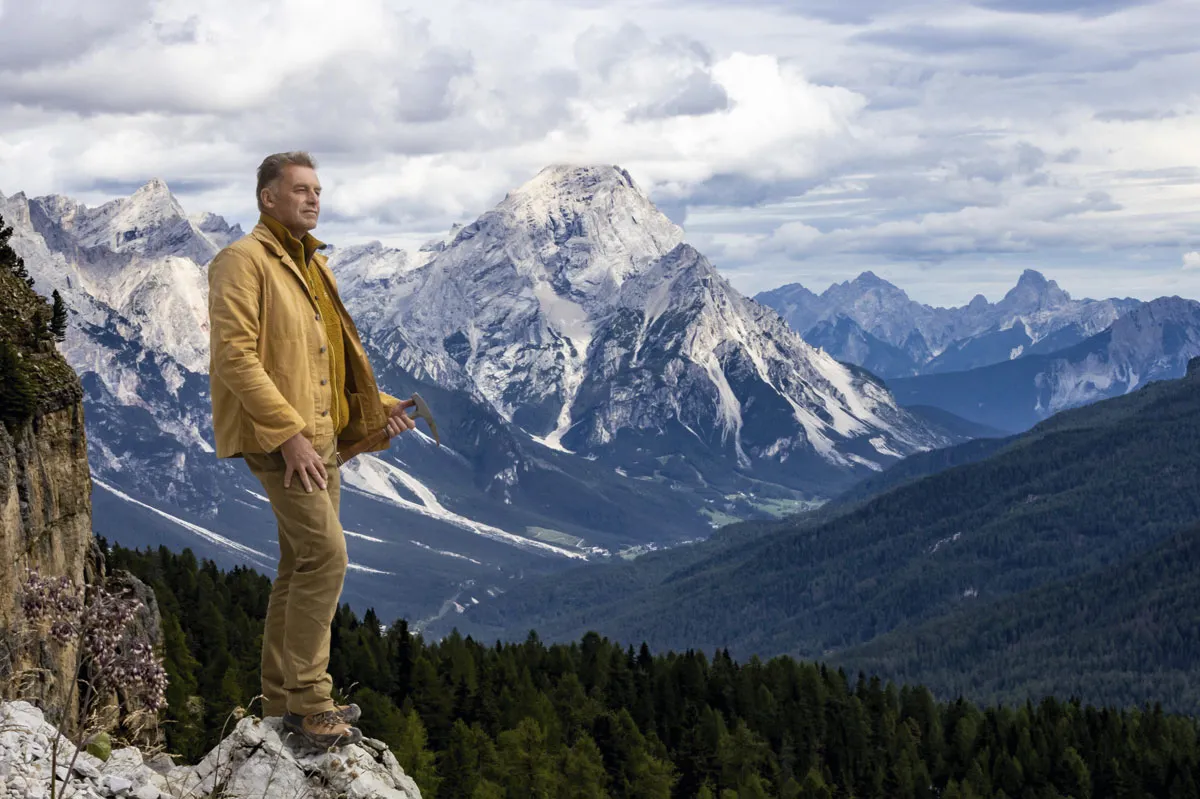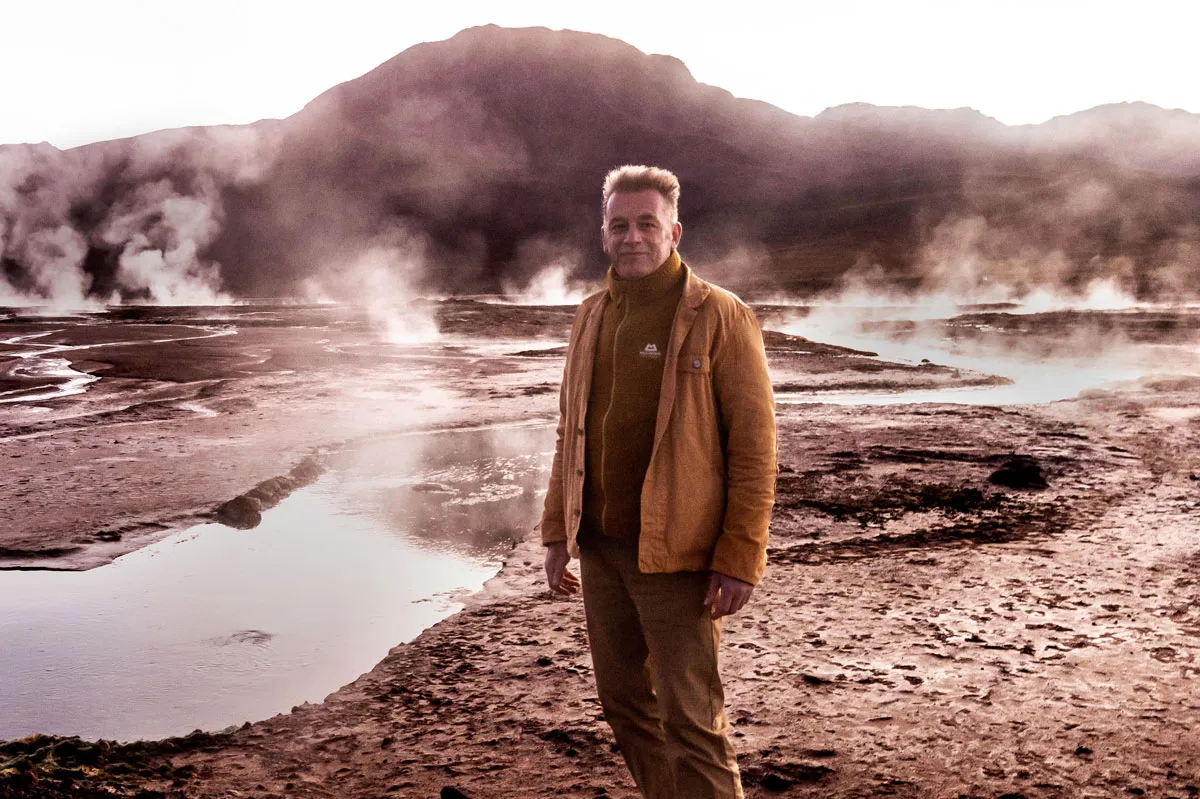The camera pans around a purple mountain rising through a lush green forest. But the film glitches… something is wrong. The scene flickers with a hellish inverse: a deadly volcanic eruption. The Earth’s crust splits and red light bleeds from its opening. Deadly rivers of lava veil the now-black rock, and ash and toxic gases spill into the air.
This fiery inferno is the deadliest volcanic event in Earth’s history, around 250 million years ago. It’s just one of many moments that have brought the planet we call home close to death – and one of the five key events that shape the BBC’s new Earth series.
This is the BBC Natural History Unit’s usual output reborn as a forensic crime thriller, with fossils as evidence. With Chris Packham presenting, Earth exposes the clues hidden in fossil records that reveal all the times the planet – and our long-gone ancestors – have almost been destroyed over the last 4.5 billion years.
In this way, Earth aims to show that our future has already happened, with the current climate crisis eerily echoing the past. But will we survive it this time around? We got the verdict from Chris Packham himself…
Your new series covers billions of years of history. How on, ahem, earth did you fit that into one series?
Our mission was to present the series as a biography of our planet. It’s not just about how Earth was born, but its bumpy life journey – akin to how it met its first girlfriend, got married, divorced, and happily remarried.
We wanted to highlight the moments that had a significant impact on the planet – the key geological, planetary and life forces. And how they interact.
For example, when the lava was beneath the surface of the planet, it was burning coal, which raised the temperature of the planet by 10°C. This was catastrophic. But now here we are digging it up and burning it again!
However, Earth is very much a science series – it’s not just about climate breakdown. There’s a lot of variety in there, with a lot of surprising facts thrown into the mix.
Try us. Blow our socks off with some science facts
Well, there used to be alligators at the North Pole during a planetary warming event. On another occasion, the whole planet almost froze in what’s called a Snowball Earth event – it was pretty much glaciated down to the equator!
And what did you personally learn that was new?
A lot. One thing was that fungi, not plants, originally dominated the land – it’s fascinating! Millions of years ago, plants were effectively trapped in the sea and couldn’t get onto the land.
It was fungi that took those first steps due to their autotrophic nature – they can essentially remove ingredients from bare rock. One of these species, Prototaxites, had fungal spikes that were eight metres high (26 feet).
Funnily enough, fossils of this fungi were hidden in museums for ages – we just didn’t know it. They were thought to be tree remains, but it took one person to think, “I’ll have another look at that.” Using new technology, they found it wasn’t a plant fossil, but a fungi fossil.

Did learning so much leave you with more questions than answers?
I think so. This happens when you love learning new things. It’s really exciting that, due to contemporary technology and its affordability, we are learning a lot, and more quickly than ever before. I likely know more about the Earth than my father or grandfather in their lifetimes because I can comfortably pick up something like BBC Science Focus and see some staggering new story.
But the greatest thrill is that you and I will go to our graves not having all the answers. It leaves room for the imagination.
What was your favourite moment during filming?
I got pooped on – by a giant condor! Magnificent birds! This massive condor floated down while I stood on an escarpment in Chile. As the bird passed by, it looked right into my eyes… and then evacuated its bowels all over me.
I was elated! Absolutely elated! If you get pooed on by an animal, you know you’re really close to it – that’s what wildlife is all about!
Earth covers the start of the planet’s history, but what about its end? Does that worry you much?
We know the planet will end when the Sun expands and Earth gets too hot. But that’s a long way off.
I think most people see mountain ranges as having some kind of permanence. But they’re very new in geological time – and really fragile!
We’re a fortunate species to have evolved at a point where there’s been incredible stability in the environment. However, that stability could be undone at any point by an asteroid or supervolcano. If Yellowstone just cracked open and got going, it really wouldn’t be atypical of Earth’s history. Although it would certainly change our role on the planet!
Ultimately, it’s all unpredictable. And I don’t mind that. I don’t like to think humans are the be-all and end-all of life and the Universe. We should respect our own species’ fragility. We’re really very special and lucky. We ought to appreciate that a bit more.
As part of this, do you a feel personal responsibility to highlight how our climate is changing?
Of course. I do see it as my job to amplify the science.
As an older person, I feel incredibly guilty. But it’s a great fuel. I don’t feel I’ve done enough, it’s like I’m asleep at the wheel, and I’ve got to do more while I have the time. So I hope other people feel as guilty as I do, because we have failed and now we need to fix it.
The reason I make my programmes is to try and get people to help make a difference, basically. It’s why you won’t catch me doing cookery shows, because they’re not going to save the world, are they?
Read more:
Do you worry the messages within your shows are drowned out by cookery and reality shows?
To an extent. But I still want to create a lot of background noise. Would I love to see more direct media attention on climate change? Yes, of course I would. Particularly in the news media – it gets distracted by things I don’t consider really newsworthy.
Nobody is going to be surprised by the comments made about the climate breakdown in Earth. But our job is to make it a considered part of everyone’s lives, so when opportunities arrive – democratically or part of everyday life – they’ll make a considered choice.
Are you optimistic humanity will survive this crisis?
Yes and no. I’m very optimistic that, ultimately, we will act to address these issues. But I’m not optimistic about whether we’re going to do it with the rapidity that’s required to prevent some considerable suffering to our species and others across the planet. Because now is the time to act and we’re still not doing it.
That’s such a motivating force for me, as I see the urgency growing every day. And I have to constantly question what my role in that is.
You’ve had many roles in many shows over the years. Do you think the kids who watched The Really Wild Show have followed you on your journey?
It’s surprising and flattering to hear that’s happened for some people. I’ve just always tried to make good programmes and deliver good, comprehensible science. Even The Really Wild Show had some complex behavioural physiological and ecological ideas in it!
I’m very pleased to have communicated science for as long as I have. Hopefully, I can keep on doing it because there’s always something new! We’ve done about 19 series of Springwatch and you could ask, “Haven’t you run out of things to say about blue tits?” Well, no! There’s always something out there that’s new!

Which one are you most proud of?
I’m not proud of anything. I’m very self-critical, so I don’t tend to perceive anything that I do as a success in the sense that other people might. When I see that in others, I see a sense of complacency. And there’s no time for complacency in my life.
For instance, last night, I was creating an art piece and only finished at 1am. Then I got up early to review it and think of ways I can do better. So I’ve cut it up and tonight I’ll have another go. Winning is not giving up, not about ever achieving anything. That’s my mantra.
Now, I’m not saying I’m personally important – let’s be clear about that. But people do come up to me and say things like, “I saw The Really Wild Show and it got me working in conservation!” That’s positive, but it’s not personal. It’s not just me who makes the programmes – Earth had a lot of people behind it!
I think that I’ve always felt uncomfortable that, as a presenter, I get a disproportionate amount of attention: my job really is quite simple. I have to be the human focus of all of that effort, all of that endeavour – and I’ve got to project that through that camera lens and out to the public. I feel an enormous sense of responsibility to do that because I’m really there just representing all of those people that come together to make it.
But I never watch myself on TV – it feels uncomfortable!
Come on. By presenting all those shows, surely that counts as making a difference personally?
Well, I hope so. I was involved in the show Inside Our Autistic Minds, which some people said was good public service broadcasting.
We’re at a time where there’s an enormous mental health crisis. Now, neurodiversity isn’t a mental health issue, but it’s certainly a condition that can generate significant mental health issues. And it’s only by creating a wider understanding of these issues that I think we’ll improve conditions for neurodiverse people.
I had a really rubbish time for about half my life due to being undiagnosed with autism – and for the condition not being really understood. I don’t want young people to go through what I went through. So that’s why I made that show.
However, ultimately it wasn’t personal. It was a BBC show and hats off to all the makers involved!
Five times the Earth almost died
Throughout its long history, Earth and the life on it have come perilously close to total destruction. Here are the narrow misses…
800 million years ago: Deep freeze I
Earth’s supercontinent Rodinia rips apart, sucking carbon dioxide from the atmosphere. As a result, temperatures drop to -70°C worldwide for 50 million years, with ice reaching the equator.
400 million years ago: Deep freeze II
Plant life becomes a victim of its own success, its rapid spread reducing atmospheric carbon dioxide levels, plummeting Earth’s temperature once more.
252 million years ago: Inferno
Massive volcanic eruptions lasting 2 million years create lava fields the size of Australia. Around 90 per cent of life on Earth dies.
66 million years ago: Chicxulub impact
An asteroid the size of Mount Everest crashes into Earth, wiping out non-avian dinosaurs. 300bn tonnes of sulphur are blasted into the sky, plunging the planet into darkness and dropping global temperatures by 20°C.
34 million years ago: Icehouse Earth
For reasons still unclear, carbon dioxide levels plummet once again, wiping out primates in the northerly continents of North America and Europe.
Read more:
Earth starts at 9pm on Monday 17 July on BBC Two. You can also watch on BBC iPlayer